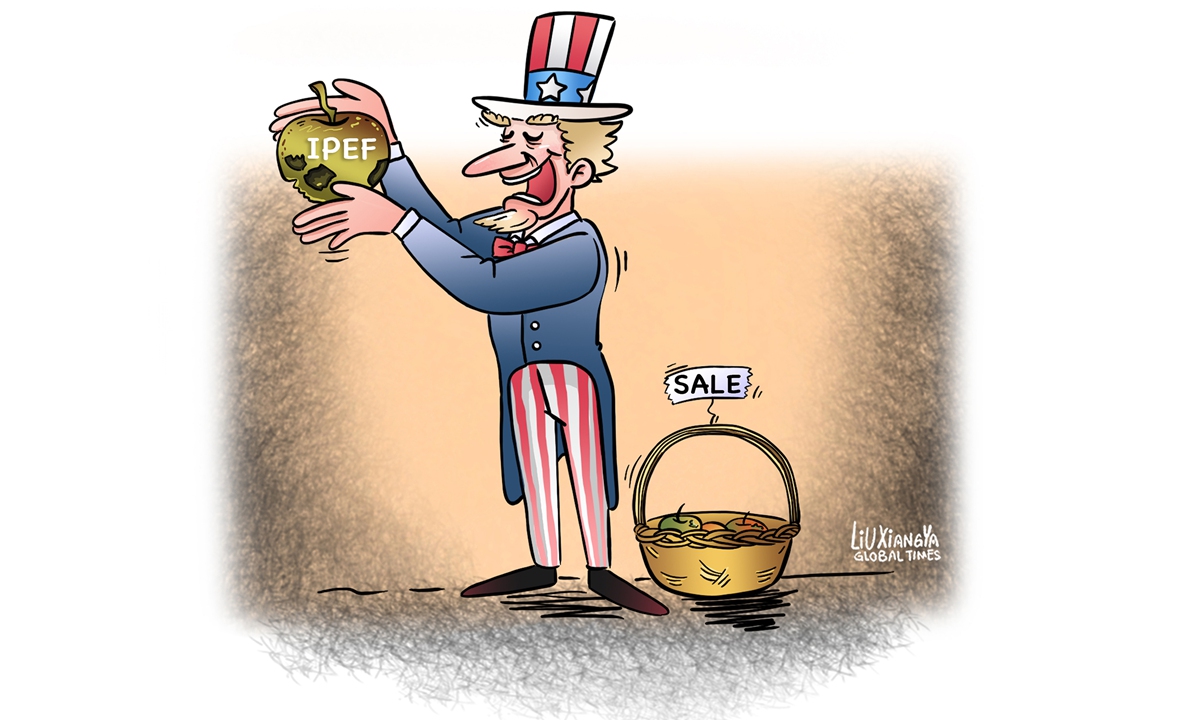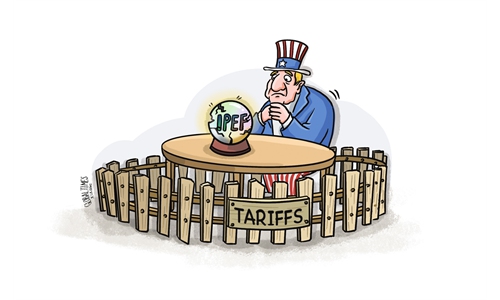IPEF trade initiative is economically meaningless if it fails to benefit participants

Illustration: Liu Xiangya/Global Times
US President Joe Biden's plan to unveil a crucial part of his Indo-Pacific economic strategy as a bargaining chip in relations with China has been derailed by opposition from Congressional Democrats, media reports said on Tuesday. The news came at a sensitive time, as people are focused on San Francisco for the 30th APEC Economic Leaders' Meeting.As reported by the Financial Times, the US intended to conclude critical elements of its Indo-Pacific Economic Framework (IPEF) trade pillar this week, showing that the US and its partners could cooperate on a strategy that Washington hoped would counter China, but the White House abruptly reversed course following pressure from influential Ohio Senator Sherrod Brown and other Democrats, who worry about the effect of a new trade deal on their election prospects next year.
The IPEF has long been criticized for offering no tariff relief to the economies that join it. If the newspaper's report is true, the US hesitation about the IPEF trade pillar means that besides tariff relief, the White House is unlikely to make big concessions even in other areas of trade liberalization ahead of the 2024 presidential election.
Although politicians in Washington are adept at defending US trade protectionism, a cautious attitude toward trade liberalization, as well as aggravated political polarization in Washington, will make it difficult for IPEF members to benefit from the trade pillar negotiations, and this affects their enthusiasm for reaching an agreement.
Since its launch in May 2022, IPEF members have engaged in intensive discussions to scope out each of the four pillars of the framework, covering trade, supply chains, the clean economy and the fair economy. US Treasury Secretary Janet Yellen said on Monday that there has been "very substantial progress" on three of the four areas under discussion by the 14 IPEF members, but there are "remaining issues" on trade, according to Reuters.
We can't rule out the possibility that more "progress" will be made in trade pillar negotiations, if Washington piles more pressure on IPEF partners, but "substantial progress" does not mean that IPEF members can truly benefit from this trade initiative. Instead, it reflects only that those members will have to make more compromises under US pressure.
Currently, the global focus is on San Francisco, or, more specifically, on China-US relations. Behind it, people are pondering how far Washington's "de-risking" campaign can go. In the recent past, a "de-risking" policy targeting China has disrupted trade between China and the US as well as global industry chains, forcing many countries to make emergency response plans, and raising concerns about the future of trade globalization and the global economy.
Since its launch, the trade initiative has been seen by observers as a strategic move to target China, with a goal to establish a network of "trusted partners" in Asia to reduce reliance on China. However, diversifying the region's supply chains could prove elusive.
According to the Peterson Institute for International Economics, analysis of data from bilateral trade flows from 2010 to 2021 provides clear evidence that the IPEF's diversification goals push against long-term market trends. China is the top import source for all IPEF members except Brunei, as well as the top export destination for half of them.
The IPEF negotiations were never aimed at reducing tariffs or improving market access for members, many of which were signatories to the Trans-Pacific Partnership trade deal that former US president Donald Trump abandoned in 2017. These economies have always hoped to enter the US market with trade preferences, so they see the IPEF as a life-saving straw. However, they may not be interested in Washington's supply chain diversification policy, which is why IPEF trade pillar negotiations are facing difficulties. If Washington cannot come up with market access "chips" to attract them, the trade initiative will be meaningless from an economic perspective.
The ongoing meetings in San Francisco offer a window to observe how sincere the US is in changing its policies and promoting free trade. It is hoped the US can demonstrate courage and wisdom, injecting stability and certainty into the turbulent global economy by safeguarding, not disrupting global supply chains.
The author is a reporter with the Global Times. bizopinion@globaltimes.com.cn


